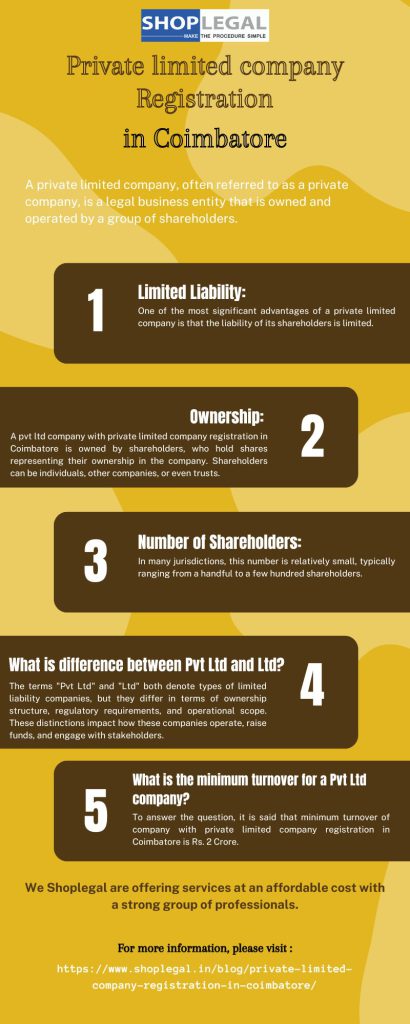Private limited company Registration in Coimbatore
TALK TO EXPERTS
A private limited company, often referred to as a private company, is a legal business entity that is owned and operated by a group of shareholders. This type of company structure is commonly used for small to medium-sized businesses and offers several benefits, including limited liability for shareholders and a more structured management framework.
Some features
Here’s an explanation of key features and characteristics of a private limited company registration in Coimbatore:
Limited Liability:
One of the most significant advantages of a private limited company is that the liability of its shareholders is limited. This means that the personal assets of shareholders are generally protected in case the company faces financial difficulties or legal issues. Shareholders are only liable for the amount they have invested in the company’s shares.
Ownership:
A pvt ltd company with private limited company registration in Coimbatore is owned by shareholders, who hold shares representing their ownership in the company. Shareholders can be individuals, other companies, or even trusts. The ownership structure is defined by the allocation of shares, and shareholders can transfer or sell their shares, subject to certain legal and regulatory requirements.
Number of Shareholders:
Unlike a public company, a private limited company has restrictions on the maximum number of shareholders it can have. In many jurisdictions, this number is relatively small, typically ranging from a handful to a few hundred shareholders. This limitation helps maintain a more closely-knit ownership structure and simplifies decision-making.
What is difference between Pvt Ltd and Ltd?
The terms “Pvt Ltd” and “Ltd” both denote types of limited liability companies, but they differ in terms of ownership structure, regulatory requirements, and operational scope. These distinctions impact how these companies operate, raise funds, and engage with stakeholders.
“Ltd,” short for “Limited,” refers to a public limited company. A public limited company is a legal entity that offers its shares to the general public, allowing anyone to invest in the company by purchasing its shares on stock exchanges. Public limited companies are often larger and have a broader scope of operations.
Due to their public nature, they are subject to more stringent regulatory requirements, including financial reporting, disclosure of information, and transparency standards. These companies are governed by a board of directors, elected by shareholders, who oversee strategic decisions and corporate governance.
Shareholders in a public limited company can easily buy and sell their shares on stock markets, providing liquidity to investors.
“Pvt Ltd,” short for “Private Limited,” refers to a pvt ltd company which can have private limited company registration in Coimbatore. This type of company has a more restricted ownership structure. The shares of a private limited company are owned by a relatively small group of shareholders, often including founders, family members, and a limited number of investors.
Private limited companies do not offer their shares to the general public; instead, ownership is often closely held and subject to approval by existing shareholders. This structure provides a level of privacy and control over ownership changes.
In terms of regulatory requirements, private limited companies typically face fewer obligations compared to their public counterparts. They have less onerous reporting and disclosure requirements, allowing for a more streamlined and cost-effective operation.
However, this reduced regulatory burden comes with limitations on capital-raising opportunities. Private limited companies can raise funds through private placements, loans, and investments from a limited group of investors.
Overall, the key differences between “Pvt Ltd” and “Ltd” can be summarized as follows:
Ownership Structure:
Pvt Ltd companies with private limited company registration in Coimbatore have a limited number of shareholders, often closely held, while Ltd companies offer shares to the general public, leading to a larger and more diverse shareholder base.
Regulatory Requirements:
Pvt Ltd companies face fewer regulatory obligations in terms of reporting, disclosure, and transparency, whereas Ltd companies are subject to more stringent regulatory standards due to their public nature.
Capital Raising:
Ltd companies have the advantage of raising capital from the public by issuing shares on stock exchanges, providing access to a broader range of potential investors. Pvt Ltd companies rely on private placements and a limited group of investors for funding.
Ownership Privacy:
Pvt Ltd companies offer more privacy regarding shareholder identities and shareholdings, while Ltd companies often have more publicized shareholder information.
Operational Scope:
Pvt Ltd companies with private limited company registration in Coimbatore are often smaller and operate within a more controlled environment, while Ltd companies tend to be larger and have a wider scope of operations.
Thus, the distinction between Pvt Ltd and Ltd companies lies in their ownership structure, regulatory obligations, capital-raising capabilities, and operational characteristics. The choice between these structures depends on the company’s size, growth ambitions, and the level of regulatory scrutiny and public exposure desired by the founders and stakeholders.
What is the minimum turnover for a Pvt Ltd company?
The minimum turnover requirement for a pvt ltd company with private limited company registration in Coimbatore can vary significantly based on the jurisdiction and local regulations in which the company is registered. Turnover refers to the total revenue generated by a company from its core business operations during a specific period, usually a fiscal year.
The turnover threshold can impact various aspects of a company’s compliance, reporting obligations, and taxation. However, it’s important to note that there is no universal minimum turnover requirement applicable to all private limited companies globally, as regulations differ from country to country.
In many jurisdictions, the concept of minimum turnover is closely tied to the determination of whether a company needs to be audited. Auditing involves the examination and verification of a company’s financial records, transactions, and statements by an independent auditor.
Companies that exceed a certain turnover threshold are often required to undergo mandatory audits to ensure financial transparency and compliance.
For instance, in some countries, private limited companies might be exempt from mandatory audits if their turnover remains below a specified threshold. This threshold is established to identify smaller businesses that may not require the same level of financial scrutiny as larger enterprises.
Threshold
The threshold is intended to strike a balance between reducing the regulatory burden on smaller businesses while maintaining financial integrity.
The specific threshold can vary significantly from country to country and can change over time due to legislative updates. Some countries might set a relatively low threshold, while others might have a higher threshold.
In certain cases, the threshold might also be influenced by factors such as the nature of the company’s activities, the number of employees, or the value of assets held.
It’s important for business owners to be aware of the turnover threshold and related regulations in their specific jurisdiction.
Falling below the threshold might provide certain administrative and financial advantages, such as reduced compliance costs and audit exemptions. On the other hand, exceeding the threshold could trigger increased reporting and auditing requirements.
Business owners and entrepreneurs looking to establish a private limited company should research and consult with legal and financial professionals who are knowledgeable about the regulations applicable in their country.
They can provide guidance on the minimum turnover requirement, audit thresholds, compliance obligations, and the implications of exceeding or remaining below these thresholds. Staying informed about these factors is crucial for making well-informed decisions regarding company operations, financial management, and growth strategies.
But to answer the question generally, it is said that minimum turnover of company with private limited company registration in Coimbatore is Rs. 2 Crore. A One Person Company should be compulsorily changed over into a Private limited company if annual turnover surpasses Rs. 2.00 crores or the settled up capital of the One Person Company surpasses Rs. 50 lakhs.
About Us
We Shoplegal are offering services at an affordable cost with a strong group of professionals.








